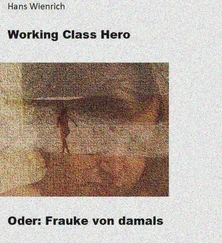Gerald came to stand next to Marie by the stove. She wanted him to lean against her shoulder or press himself against her as he once had. She wanted him to take her hand or link his arm through hers. Anything. Any small touch to help her feel the presence of her own family, to let her think she had some semblance of the scene in front of her, some bit of that same devotion. But Gerald kept a foot’s distance between them, and when he spoke, his interest wasn’t in her.
“Does this mean Pa’s coming, too?”
“No.”
“Why not?”
“He has a longer sentence.”
“Wilson didn’t have to stay for his whole sentence.”
The Grices continued their praising and cursing, their holding and squeezing. They had become one mass, the children and Moa fusing Wilson to them, guaranteeing his place.
“Mama,” Gerald said, “I want to visit him.”
Marie shook her head.
“He’s my father.”
Marie turned to the percolator behind her, bubbling at its lid.
“I’m going to write to him,” Gerald continued, “and tell him you’re the reason I haven’t written before. And you’re going to let me read his letters.”
Marie tried to find words, something to say to convince Gerald of his mistake. Her mouth was sticky, though, every word catching in the dry pull of her gums, the trap of her tongue. She couldn’t say anything. She could only pour coffee into mugs.
“Mother,” Gerald insisted. He was closer to her than he’d been in more than a year, his mouth next to her cheek, his breath on her skin. He had a boy’s breath, still, a smell like autumn soil, dry and sweet, but he stood inches taller than her, his pants too short before they’d been broken in, his shirts too tight across his widening shoulders, his sleeves hanging silly inches above his wrists. He was nearly twelve.
“No.” Look at Wilson, Marie wanted to say. Look at what’s left of his arm. Look at the scars on his one hand and the broken weight in his face. Your father did that. He is no one you want to know .
Gerald brought his fists down on the countertop, rattling the mugs, sloshing coffee over their edges into shallow pools.
“Gerald, honey,” Moa said. “What is it?”
“Nothing, Miss Moa.” He ducked his head and went to the back door, stopping there to look at Wilson. “I’m glad you’re back.”
“Thank you, son.”
“Gerald,” Marie called. “Wait, love.”
But Gerald was out the door.
“He missin’ his father?” Wilson asked.
Marie pressed her hand against her eyes and tucked her chin. “Yes,” she whispered.
“How often have you been to visit?”
Marie looked up to see Moa whispering in Wilson’s ear. She was brief, and Marie watched Wilson take in his wife’s words. What would he think of Marie’s decision to stay away? She wanted Wilson to see the solidarity in it, the defense of his side, the anger and pain and resentment she felt for Roscoe. But he could just as easily see her as an angry, self-indulgent woman, flaunting her privilege to make that choice. Moa had been left with nothing — no information, no location, no letters — while Marie had been given everything. She knew Roscoe’s employment at Kilby, his cellmates, his librarian and deputy warden and barn foreman. She knew how easy it would be to schedule a visit, and that they could even request an afternoon furlough because of Roscoe’s good behavior. She could come with a picnic and they could eat together in the oak grove Roscoe had described in his letters, just as Eddings had suggested that day he took Roscoe away.
Would Wilson see her as petty and vindictive, worse, even, than the man who’d gotten them all there?
“Boy’s missin’ his father,” Wilson said again. “How’re you doing, Miss Marie?”
“I’m doing fine, Wilson, just fine.” She appreciated his turning the subject away from her own guilt. “But you, can you talk about your time?”
Wilson brought his hand to the top of his head, rubbing the short bristles there, the black peppered with white. He’d always rubbed his head when confronted with a question he wasn’t sure of answering, and Marie smiled at the habit, something familiar and comforting.
“What do you already know?” he asked, looking between Marie and Moa, asking them both.
“Nothing,” they said together.
Marie continued, “You disappeared after Kilby. Our lawyer couldn’t track down any records of where you went.”
“Probably for the best. Visiting wasn’t allowed in our camp, and those lost papers were what set me loose.” Wilson kept his hand on his head, then he reached down for his cup of coffee, sipping at it delicately. “Ah. Missed that taste, sure enough.” He kept the mug near his mouth and talked over the steam. “Intake was fast, there at Kilby. They’re supposed to do this thorough study , they said, taking down our history and poking into our brains and getting at our deep thoughts, but for me, they just asked what it was I’d been doing for work, and then they said mining made the most sense. ‘Flat Top’s in need of men right now,’ the fellow said. ‘It’ll keep you out of prison, keep you fit.’
“They shipped me out the next day. I got trained quick to be part of the crew that came in right after the first blast.” Wilson set his mug down and set to rubbing his head again. “Suppose that’s about it. I worked down in the tunnels until this happened”—he raised the stump of his left arm—“and then I spent time in the infirmary, and then they sent me home.”
Moa had her hands on his shoulders while he talked, and Marie watched her fingers knead the muscle there. Their children flanked her. “That’s enough,” she said. She leaned down and kissed him on the head. “I’m so glad you’re here.”
Marie was frustrated with Moa’s shushing. She wanted to know everything about Wilson’s time in those tunnels. She needed the specifics — the sounds and textures and tastes, coal-dusted air and explosion-shattered rock, the damp floors and kerosene lanterns, the black-edged sky and housing and meals. “Wilson, what was it like?”
“He’s said enough,” Moa warned.
Their children stared at Marie, their eyes lit by Moa’s same protection. He’s ours, their faces said, their lips held firm, their eyes open wide. You and yours have taken enough .
Marie agreed.
Wilson set his mug down and looked over at Marie. “It was awful, Miss Marie. If you need more than that, you’ll have to give me time.”
Marie nodded, ashamed. “Of course.”
Moa leaned her head down close to Wilson’s ear and said gently, “Let’s go on back to our place, dear.”
Marie watched Jenny and Charles and Henry swarm their father, lifting him from his chair, floating him into standing. They moved as a unit, gliding across Marie’s floor with the ease of birds — a flock of them, or a wing; they were like plovers moving over the sand, their steps smooth and fluid. They drifted out the door and out across the grass, disappearing from Marie’s sight around the corner of the house. She imagined them taking flight just then, tucking their quick feet up against their soft stomachs, stretching their wings — Wilson’s left would be back, a broad, feathered limb to replace that half-held arm — arching their necks to the clouds. They would fly over the hot-hearted power lines and the thick stand of longleaf pines and holly, glancing out at the fields, the patched grid of their land, and then they would slow their speed, dropping down to the small meadow outside their small house — everything small — and they would gather together in their clutch, moving as one toward the door.
Marie thought about her son, that small boy born into so much blood and wreckage, his own swaddling blanket more for mopping than for warmth. There he was, sticky with blood, passed over to Roscoe while the doctor focused on Marie, and Marie turned inward, a quiet taking over the room she shared with her husband. The quiet had been like fog, she remembered, creeping in at the edges of her hearing, muting it; the baby’s crying was buffered and blanketed by flannel and cotton, thick sounds settling over everything — the doctor’s hurried words, desperate and pleading, the metal-on-metal ringing of his instruments, the nurse he employed, her shoes on the floor, moving and clacking — all of it quieted down to a slow-drumming pulse, the like of river currents or tides, a rumbling, deeply tied rhythm.
Читать дальше












